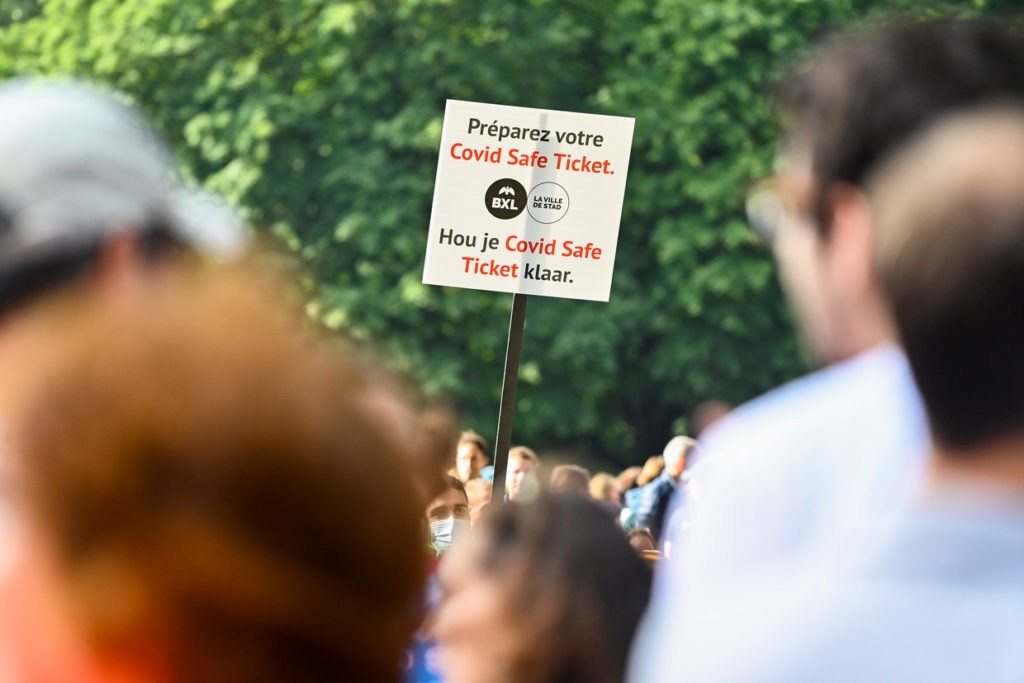Unia, the national human rights institution, is not in favour of expanding the Covid Safe Ticket (CST) to more sectors and situations in Belgium, saying that its current application could infringe on people's fundamental rights.
If the use of the CST is expanded, people could be required to prove that they are fully vaccinated, have recently tested negative or recovered from an infection in the past six months to gain access to bars, gyms or even hospitals.
By not only accepting vaccination but also test or recovery certificates, authorities hope to avoid putting the focus on the vaccine. Yet the CST could still encourage discrimination, according to Unia.
"While it is true that test and recovery certificates are important, it is also important to note that PCR tests are expensive, and so it becomes a costly affair," Els Keytsman, director at Unia, told The Brussels Times.
"There are also people who cannot be vaccinated due to illness, allergy or disability, but even for them the tests are not free or easily accessible," she said. "In other countries, such as Denmark, you can find testing centres on every street corner, so to speak."
"We fear that this will result in a polarisation between vaccinated and non-vaccinated people, the supposed healthy versus the unhealthy people. We are on a slippery slope," stressed Keytsman.
Related News
- Denying freedoms to non-vaccinated people 'certainly' possible, says Belgian Health Minister
- Flanders is open to expanding Covid Safe Ticket, says Jambon
- Require Covid Safe Ticket for visitors in hospitals, says Flemish care sector
"In the beginning, there was talk of a Covid passport that we should only use for travelling. Later, it was also said that we might need it to attend big events," she said.
While the EU Digital Covid Certificate was introduced before the summer as an instrument to facilitate travel, Belgium's CST was later applied to events and is now being considered for many other areas as well, ranging from bars to hospital visits.
"But it was always said that it would only be temporary, and its use would be limited," Keytsman said. "Now we see that more and more ideas to make the CST compulsory in other situations too are being considered."
"These are important questions to consider, and a discussion about them should be held in parliaments, together with citizen's organisations," she added.
By expanding the use of the CST, Belgium is making vaccination compulsory but in a roundabout way, Unia believes. "By requiring it in certain sectors, the government is shifting the responsibility to the private sector."
Unia agrees with the objective of the CST, which is to prevent people from getting sick, but the way Belgium goes about it must be carefully thought through.
In that case, such a pass might not be the best method since it could threaten people's fundamental rights, and it might be better to hold a debate about compulsory vaccination for certain groups and professions, such as the healthcare sector, says Keytsman.
"Legal theory says that it can be done, but then it has to be done after a thorough parliamentary debate so that the responsibility lies where it belongs: with the government," Keytsman said.
The vaccine against polio, for example, was also made mandatory, which shows that it is possible, provided that there is a societal debate and it has a good legal basis.
Arbitrary checks
The CST scheme must remain temporary, but the authorities are constantly shifting the timeframe. "With each measure that is introduced, we must ask ourselves 'is this the measure that least limits our freedom?'"
On top of that, Unia questions who will check the CSTs, and how those checks will be conducted. "What will the CST be used for and not be used for, in which sectors and for how long? And above all: who is going to check them?"
Keytsman referred to the rules for face masks, which showed that the people who monitor compliance are not always fully aware of the regulations.
"There are people who do not have to wear a mask because they have a disability or a certain illness, for example," she said. "During inspections, this leads to misunderstandings and embarrassing situations."
The organisation fears that the same will happen with the CSTs, as the government introduced them with a clear objective but leaves checks and controls up to the sectors that have to work with it. "This is not consistent, because it can lead to stricter controls in one sector than in another. That is how you get arbitrariness."
So far, Unia has received various complaints and questions about this, including from organisers who want advice on how to set up certain events.
"The CST is not the be-all, end-all solution," Keytsmand said. "What we need is a good mix of rules, with legal backing, and without stigmatisation."

